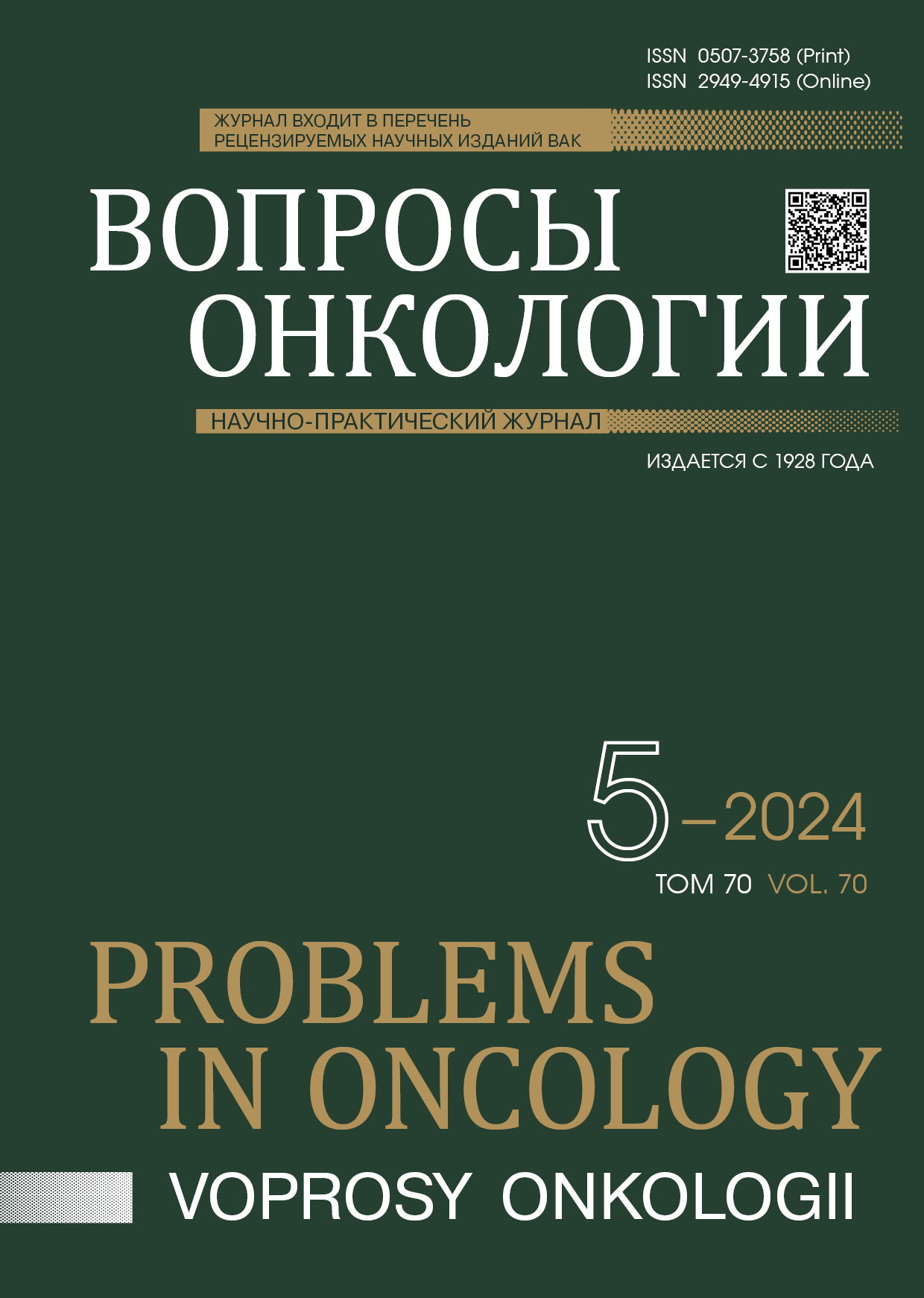摘要
Введение. Для онкологических пациентов, исчерпавших возможности стандартной терапии, представляется допустимым использование безопасных лекарственных препаратов, продемонстрировавших признаки противоопухолевой активности в доклинических исследованиях. Например, ингибитор дигидрооротатдегидрогеназы (DHODH) лефлуномид, используемый для противовоспалительной терапии, может обладать определённой активностью по отношению к KRAS-мутированным новообразованиям. Помимо этого, в ходе лабораторных исследований и единичных клинических наблюдений получены сведения о перспективности комбинирования МЕК-ингибиторов с гидроксихлорохином для карцином, характеризующихся активацией генов семейства RAS.
Материалы и методы. Нами выполняется многоцентровое, проспективное, когортное исследование фазы II NTO-RAS, которое направлено на изучение потенциальной эффективности упомянутых подходов.
Выводы. Данная статья посвящена обоснованию целесообразности и описанию дизайна этого исследования.
参考
Martianov A.S., Mitiushkina N.V., Ershova A.N., et al. KRAS, NRAS, BRAF, HER2 and MSI status in a large consecutive series of colorectal carcinomas. Int J Mol Sci. 2023; 24(5): 4868.-DOI: https://doi.org/10.3390/ijms24054868.
Simanshu D.K., Nissley D.V., McCormick F. RAS proteins and their regulators in human disease. Cell. 2017; 170(1): 17-33.-DOI: https://doi.org/10.1016/j.cell.2017.06.009.
Prior I.A., Hood F.E., Hartley J.L. The frequency of RAS mutations in cancer. Cancer Res. 2020; 80(14): 2969-2974.-DOI: https://doi.org/10.1158/0008-5472.CAN-19-3682.
Huang L., Guo Z., Wang F., Fu L. KRAS mutation: from undruggable to druggable in cancer. Signal Transduct Target Ther. 2021; 6(1): 386.-DOI: https://doi.org/10.1038/s41392-021-00780-4.
Negrao M.V., Spira A.I., Heist R.S., et al. Intracranial efficacy of adagrasib in patients from the KRYSTAL-1 trial with KRASG12C-mutated non-small-cell lung cancer who have untreated CNS metastases. J Clin Oncol. 2023; 41(28): 4472-4477.-DOI: https://doi.org/10.1200/JCO.23.00046.
Sacher A., LoRusso P., Patel M.R., et al. Single-agent divarasib (GDC-6036) in solid tumors with a KRAS G12C mutation. N Engl J Med. 2023; 389(8): 710-721.-DOI: https://doi.org/10.1056/NEJMoa2303810.
Jin R., Liu B., Liu X., et al. Leflunomide suppresses the growth of LKB1-inactivated tumors in the immune-competent host and attenuates distant cancer metastasis. Mol Cancer Ther. 2021; 20(2): 274-283.-DOI: https://doi.org/10.1158/1535-7163.MCT-20-0567.
O'Donnell E.F., Kopparapu P.R., Koch D.C., et al. The aryl hydrocarbon receptor mediates leflunomide-induced growth inhibition of melanoma cells. PLoS One. 2012; 7(7): e40926.-DOI: https://doi.org/10.1371/journal.pone.0040926.
Hanson K., Robinson S.D., Al-Yousuf K., et al. The anti-rheumatic drug, leflunomide, synergizes with MEK inhibition to suppress melanoma growth. Oncotarget. 2017; 9(3): 3815-3829.-DOI: https://doi.org/10.18632/oncotarget.23378.
Alamri R.D., Elmeligy M.A., Albalawi G.A., et al. Leflunomide an immunomodulator with antineoplastic and antiviral potentials but drug-induced liver injury: A comprehensive review. Int Immunopharmacol. 2021; 93: 107398.-DOI: https://doi.org/10.1016/j.intimp.2021.107398.
Cheng L., Wang H., Wang Z., et al. Leflunomide inhibits proliferation and induces apoptosis via suppressing autophagy and PI3K/Akt signaling pathway in human bladder cancer cells. Drug Des Devel Ther. 2020; 14: 1897-1908.-DOI: https://doi.org/10.2147/DDDT.S252626.
Madak J.T., Bankhead A. 3rd, Cuthbertson C.R., et al. Revisiting the role of dihydroorotate dehydrogenase as a therapeutic target for cancer. Pharmacol Ther. 2019; 195: 111-131.-DOI: https://doi.org/10.1016/j.pharmthera.2018.10.012.
Koundinya M., Sudhalter J., Courjaud A., et al. Dependence on the pyrimidine biosynthetic enzyme DHODH is a synthetic lethal vulnerability in mutant KRAS-driven cancers. Cell Chem Biol. 2018; 25(6): 705-717.e11.-DOI: https://doi.org/10.1016/j.chembiol.2018.03.005.
Orlov S.V., Urtenova M.A., Sviridenko M.A., et al. Rapid improvement of the performance status and reduction of the tumor size in KRAS-mutated colorectal cancer patient receiving binimetinib, hydroxychloroquine, and bevacizumab. Case Rep Oncol. 2020; 13(2): 985-989.-DOI: https://doi.org/10.1159/000509241.
Yaeger R., Corcoran R.B. Targeting alterations in the RAF-MEK pathway. Cancer Discov. 2019; 9(3): 329-341.-DOI: https://doi.org/10.1158/2159-8290.CD-18-1321.
Stalnecker C.A., Der C.J. RAS, wanted dead or alive: Advances in targeting RAS mutant cancers. Sci Signal. 2020; 13(624): eaay6013.-DOI: https://doi.org/10.1126/scisignal.aay6013.
Bryant K.L., Stalnecker C.A., Zeitouni D., et al. Combination of ERK and autophagy inhibition as a treatment approach for pancreatic cancer. Nat Med. 2019; 25(4): 628-640.-DOI: https://doi.org/10.1038/s41591-019-0368-8.
Kinsey C.G., Camolotto S.A., Boespflug A.M., et al. Protective autophagy elicited by RAF→MEK→ERK inhibition suggests a treatment strategy for RAS-driven cancers. Nat Med. 2019; 25(4): 620-627.-DOI: https://doi.org/10.1038/s41591-019-0367-9.
Simon R. Optimal two-stage designs for phase II clinical trials. Control Clin Trials. 1989; 10(1): 1-10.-DOI: https://doi.org/10.1016/0197-2456(89)90015-9.
Mross K., Frost A., Steinbild S., et al. A phase I dose-escalation study of regorafenib (BAY 73-4506), an inhibitor of oncogenic, angiogenic, and stromal kinases, in patients with advanced solid tumors. Clin Cancer Res. 2012; 18(9): 2658-67.-DOI: https://doi.org/10.1158/1078-0432.CCR-11-1900.
Brahmer J.R., Drake C.G., Wollner I., et al. Phase I study of single-agent anti-programmed death-1 (MDX-1106) in refractory solid tumors: safety, clinical activity, pharmacodynamics, and immunologic correlates. J Clin Oncol. 2010; 28(19): 3167-75.-DOI: https://doi.org/10.1200/JCO.2009.26.7609.
Saint-Raymond A., Hill S., Martines J., et al. CONSORT 2010. Lancet. 2010; 376(9737): 229-30.-DOI: https://doi.org/10.1016/S0140-6736(10)61134-8.
Kaltwasser J.P., Nash P., Gladman D., et al. Efficacy and safety of leflunomide in the treatment of psoriatic arthritis and psoriasis: a multinational, double-blind, randomized, placebo-controlled clinical trial. Arthritis Rheum. 2004; 50(6): 1939-50.-DOI: https://doi.org/10.1002/art.20253.
Gonzalez-Cao M., Mayo de Las Casas C., Oramas J., et al. Intermittent BRAF inhibition in advanced BRAF mutated melanoma results of a phase II randomized trial. Nat Commun. 2021; 12(1): 7008.-DOI: https://doi.org/10.1038/s41467-021-26572-6.

This work is licensed under a Creative Commons Attribution-NonCommercial-NoDerivatives 4.0 International License.
© АННМО «Вопросы онкологии», Copyright (c) 2024

